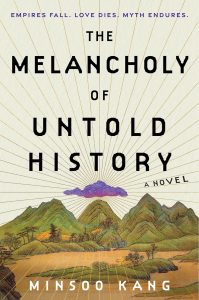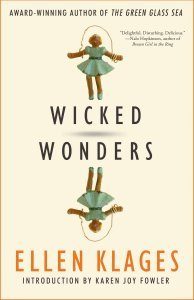Gary K. Wolfe Reviews The Melancholy of Untold History by Minsoo Kang
 The Melancholy of Untold History, Minsoo Kang (William Morrow 978-0-06333-750-3, $28.00, 240pp, hc) July 2024.
The Melancholy of Untold History, Minsoo Kang (William Morrow 978-0-06333-750-3, $28.00, 240pp, hc) July 2024.
Early in Minsoo Kang’s remarkable first novel The Melancholy of Untold History, a character known only as the historian makes an interesting observation about how civilizations tell their own stories. First, he says, come ‘‘tales of gods, monsters, and heroes,’’ followed by historical narratives of ‘‘important personages of the past who achieved great things in the world,’’ finally settling into the modern concern with ‘‘the lives of ordinary people, including their inner thoughts and feelings.’’ These are all, of course, varieties of storytelling, and while the argument isn’t exactly new (you can trace variations of it at least as far back as the Victorians), it also describes the basic structure of Kang’s multipart narrative, which relentlessly questions the relationships between myth, history, and fiction. The historian even suggests a few hybrid categories, like ‘‘critical fabulation’’ and ‘‘fabulist history,’’ both of which involve using the techniques of fiction to illuminate history and vice versa. At one point, musing about the anonymous and forgotten figures of history, the historian thinks ‘‘perhaps fiction is the only way their stories could be told.’’
Kang, a historian as well as a fiction writer (he published a collection in 2006, and has appeared in F&SF, Lightspeed, and elsewhere), is clearly fascinated by these questions, but his novel is anything but a series of dry intellectual debates (though it did seem to me to have a few dusty corners). Instead, it’s an energetic and ambitious epic covering some 3,000 years in the history of The Realm of the Grand Circle, most of which consists of a series of dynasties that evoke aspects of East Asian traditions. We’re first introduced to this world by a once-famous storyteller – now one of those nameless figures from history – who is summoned before the emperor to entertain him, on the condition that the stories never repeat themselves and are all wholly original. The tales that the storyteller concocts, involving squabbling gods and goddesses who inhabit a nearby mountain called the Four Verdant Mothers, comprise the second and liveliest narrative bloc, spinning a convoluted and often hilarious tale involving the theft of a peach, a burping dragon, and a resultant falling out among the gods. A third narrative line follows the history of the successive dynasties of the realm and their various wars and diplomatic tricks, and military strategies, largely as understood and recreated by that contemporary historian, who teaches at Dragon Child National University–whose name makes it clear that this society is a modern descendant of those earlier dynasties. The historian made his reputation by proving his bold assertion that several centuries of his country’s accepted history were entirely fabricated by an earlier ruler, at monstrous cost to those involved. The striking image which recurs and links these disparate narratives and eras is a strange purple cloud with red lightning.
If the storyteller’s tales of gods represent myths and the historian’s discoveries represent historical narrative, the historian’s own tale reflects the ordinary-people focus of the contemporary novel – almost to a fault. The central relationship – the historian’s affair with a younger colleague (conducting her own research on the suppressed history of women) – could almost be borrowed from half the academic novels ever published, and the characters tend to talk at each other in paragraph-long explanations, sometimes resorting to therapy-speak. Fortunately, both figures are highly articulate people with ideas that I found interesting enough to keep me intrigued. At times during these chapters, our own world seems to bleed into the tale in subtle ways; there’s a brief reference to Borges’s Tlön (from one of the most famous stories about an invented country), and the historian alludes to the Pacific Ocean and to characters from Proust and Somerset Maugham. Kang seems determined to show us that Story is as much a web as a cauldron, connecting the most ancient myths and the most contemporary anxieties, with what we think of as history as a kind of mediator. Since it’s almost impossible to read The Melancholy of Untold History without coming away haunted by these questions, he’s succeeded brilliantly, and given us one of the more inventive and intellectually provocative fantasies of the year.
Gary K. Wolfe is Emeritus Professor of Humanities at Roosevelt University and a reviewer for Locus magazine since 1991. His reviews have been collected in Soundings (BSFA Award 2006; Hugo nominee), Bearings (Hugo nominee 2011), and Sightings (2011), and his Evaporating Genres: Essays on Fantastic Literature (Wesleyan) received the Locus Award in 2012. Earlier books include The Known and the Unknown: The Iconography of Science Fiction (Eaton Award, 1981), Harlan Ellison: The Edge of Forever (with Ellen Weil, 2002), and David Lindsay (1982). For the Library of America, he edited American Science Fiction: Nine Classic Novels of the 1950s in 2012, and a similar set for the 1960s. He has received the Pilgrim Award from the Science Fiction Research Association, the Distinguished Scholarship Award from the International Association for the Fantastic in the Arts, and a Special World Fantasy Award for criticism. His 24-lecture series How Great Science Fiction Works appeared from The Great Courses in 2016. He has received six Hugo nominations, two for his reviews collections and four for The Coode Street Podcast, which he has co-hosted with Jonathan Strahan for more than 300 episodes. He lives in Chicago.
This review and more like it in the July 2024 issue of Locus.
 While you are here, please take a moment to support Locus with a one-time or recurring donation. We rely on reader donations to keep the magazine and site going, and would like to keep the site paywall free, but WE NEED YOUR FINANCIAL SUPPORT to continue quality coverage of the science fiction and fantasy field.
While you are here, please take a moment to support Locus with a one-time or recurring donation. We rely on reader donations to keep the magazine and site going, and would like to keep the site paywall free, but WE NEED YOUR FINANCIAL SUPPORT to continue quality coverage of the science fiction and fantasy field.
©Locus Magazine. Copyrighted material may not be republished without permission of LSFF.






